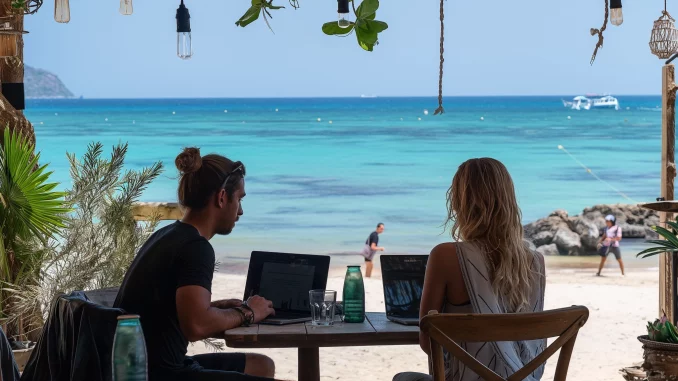
As work dynamics evolve, digital nomadism emerges, revolutionising traditional employment by emphasising flexibility and autonomy over fixed locations. This transition demands a fresh approach to financial planning tailored to the distinct challenges and necessities of digital nomads, freelancers, and remote workers.
Central to succeeding in this lifestyle is not merely the allure of freedom and global exploration but a rigorous approach to managing finances. Achieving financial stability, ensuring sustained growth, and securing one’s economic future are paramount, requiring meticulous planning, discipline, and a strategic mindset focused on long-term success amidst the unpredictability of nomadic life.
Emergency Savings & Fund
Establishing a robust emergency fund is a cornerstone of financial stability, especially for those leading a nomadic lifestyle. The unpredictability of income streams, coupled with the potential for unforeseen expenses, underscores the importance of having accessible funds that can cover living expenses for an extended period.
Typically, aiming for a reserve that can sustain one’s lifestyle for 3 to 6 months is advisable. This fund acts as a financial buffer, safeguarding against the volatility of freelance income and unexpected situations, such as health emergencies or urgent travel needs.
Diverse Income Sources

Relying on a single source of income is risky for anyone, but it’s particularly precarious for digital nomads. Diversification is key. This means cultivating a mix of passive and active income streams to create a more stable financial foundation.
Passive income could derive from investments, affiliate marketing, or digital products, while active income would encompass freelance projects, consultancy, or running an online business. This strategy reduces financial risk and ensures a more consistent cash flow, which is essential for managing irregular expenses.
Adaptive Budgeting
Budgeting for a nomadic lifestyle demands flexibility. Income and expenses can fluctuate significantly, influenced by project availability, travel plans, and local cost of living. An adaptive budgeting approach allows for adjustments to be made in real-time, ensuring that spending aligns with current income levels while still prioritising savings and investment goals. Utilising budgeting tools and apps designed for variable income can aid in this process, providing insights and analytics to make informed financial decisions.
Global Tax Compliance
Navigating the complexities of international tax obligations is a critical aspect of financial planning for digital nomads. This includes understanding tax residency rules, leveraging tax treaties to avoid double taxation, and optimising tax efficiency through legal means. It’s often beneficial to consult with a tax professional with expertise in expatriate and digital nomad tax issues to ensure compliance and optimise one’s tax situation.
Comprehensive Insurance

The transient nature of a nomadic lifestyle amplifies the need for comprehensive insurance coverage. This should encompass health insurance, including international and travel health plans, and coverage for personal property and professional liability. Given the geographical mobility of digital nomads, finding insurance solutions that offer global coverage and flexibility in terms of policy adjustments based on current country of residence is paramount.
Investment & Retirement Planning
Planning for the future is essential, with a focus on investment and retirement strategies that are both growth-focused and adaptable. Digital nomads should seek investment opportunities that offer liquidity and flexibility, considering the potential need for access to funds across different geographies. Retirement planning may involve setting up a self-employed pension plan or contributing to a portable retirement savings account that remains relevant regardless of location.
Banking & Currency Management
Effective management of banking and currency is crucial for minimising financial friction. This includes selecting banking services that are friendly to a nomadic lifestyle offering features such as low international transaction fees, multi-currency accounts, and global ATM access. Additionally, strategies for minimising currency conversion costs—such as using forex transfer services or digital wallets—can save significant money over time.
Expense Monitoring
Embracing a nomadic lifestyle opens avenues for financial optimisation, challenging the notion that it invariably leads to higher expenses. A primary allure for many is the strategic advantage of selecting destinations based on favourable cost-of-living indices, allowing for significant savings without sacrificing lifestyle quality.
This geographical arbitrage, combined with the savvy use of technological tools such as expense-tracking applications and cost-comparison platforms, empowers digital nomads to manage their finances precisely. By making informed decisions on where to live and how to spend, nomads can enjoy an enriching lifestyle while maintaining or even improving their financial health.
Professional Networking & Work-Life Balance

Achieving a harmonious work-life balance and cultivating a robust professional network is pivotal for thriving as a digital nomad. Effective networking opens doors to new opportunities and collaborations and establishes a support system essential for navigating the challenges of a nomadic lifestyle.
Balancing professional commitments with leisure and self-care is vital to avoid burnout, ensuring the sustainability of this lifestyle choice. This equilibrium allows digital nomads to fully embrace the freedoms of their chosen path while fostering personal and professional development, laying the groundwork for a rewarding and enduring nomadic journey.
Legal Awareness & Cultural Adaptation
Navigating the nomadic lifestyle requires a keen understanding of each destination’s legal frameworks and cultural landscapes. Awareness of visa stipulations, work permit regulations, and local laws is crucial to avoid legal pitfalls and ensure uninterrupted travel and work.
Equally important is the capacity for cultural adaptation—embracing local customs, etiquette, and societal norms fosters more profound connections with host communities and enriches the overall experience. This dual focus on legal preparedness and cultural sensitivity lays the foundation for a fulfilling and seamless journey across borders, enhancing the richness and diversity of the digital nomad lifestyle.
Wrapping Up
For digital nomads, freelancers, and online workers, embracing these financial planning essentials is about ensuring financial stability and unlocking the true potential of a flexible, nomadic lifestyle. It’s about making smart moves that enable growth, freedom, and security, seamlessly allowing for a life that blends work and adventure. The key lies in proactive planning, adaptability, and the strategic use of technology, all aimed at supporting a sustainable and fulfilling way of living and working.